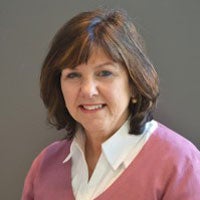Twice a year, healthcare students of various disciplines throughout the state takeover Alpert Medical School of Brown University. This state-wide collaborative effort provides healthcare students the opportunity to participate in two interprofessional workshops throughout the academic year. “The goal of the workshops is to introduce healthcare students to team-based patient care within their licensure,” describes Dr. Celia MacDonnell, a key coordinator of the program and a clinical professor in URI’s College of Pharmacy. The grassroots of the project began in 2005 with a series of interprofessional practice modules for URI nursing and pharmacy students and expanded in 2008 to include medical students. The program has expanded to include URI’s Department of Physical Therapy, RIC’s Schools of Social Work and Nursing, and Salve Regina’s College of Nursing. The workshops convene at Warren Alpert Medical School every November and April and focus on the IPE core competencies.
The first workshop concentrates on the competencies of teamwork and communication. MacDonnell notes for many the fall workshop is an introduction to IPE, describing the workshop as: “a chance for [students] to get to know what each other does and recognize you can’t do this alone. They need each other, and you need to be a part of the team.” Students are divided into groups and rotate between three different stations. Students spend about 45 minutes at each station which include: a team building station, a station where students receive a complex patient case, and a station where teams met with a standardized patient.
For the team building exercise, students work together to make a free-standing tower out of spaghetti. MacDonnell runs the complex case study station, i.e. a patient with multiple conditions and/or barriers to access care. MacDonnell states: “the reason the case works is because each faculty group has helped develop the case – the faculty group work together to make sure there is something for each of the different disciplines.” At the third station, each team meets with a standardized patient that has a respiratory disease, such as community acquired pneumonia. Students work together to assess and treat the patient. During the spring workshop, the same cohort of students are provided with a more advanced IPE experience. This workshop is currently funded by a 3-year grant through Substance Abuse and Mental Health Services Administration. The stations revolve around opioid misuse and treatment. The components of the workshop include a patient panel, a standardized patient, and a paper-based case study of a homeless person misusing opioids. Students learn how to identify and treat an opioid overdose using intranasal naloxone, a nasal spray that can reverse the effects of excessive opioid consumption. Students are exposed to interprofessional values and ethics as they learn that opioid addiction is a condition that needs medical treatment. Students learn the experience of patients with a history of opioid misuse and addiction from those who have abstained from medications and substances for 6+ years.
At the end of both workshops, students debrief with faculty about what they feel went well and what they could improve upon. During the debrief students discuss whether or not they could have cared for this patient alone instead of with a team of health professionals. MacDonnell states that students often say: “this was hard but wonderful.”
Teams are evaluated by faculty coordinators and standardized patients. The faculty evaluation is based on the 4-IPE competencies. Standardized patients critique the care provided, how well students worked together and communicated with the patient, and if they would return to for a follow-up visit with this healthcare team.
These workshops create a positive environment that allows students to learn from mistakes. MacDonnell stresses: “There are no negatives with this; it’s a safe place to work together, there is nothing that they can do wrong. This learning experience is not about singling out students if they make a mistake, but about students finding their place in the healthcare team.” MacDonnell finds the workshops build self-confidence. “Students come out and say, ‘I went in thinking I didn’t know anything, but i do!’”
The ability for these universities to organize and execute these enormous training opportunities is truly remarkable. On average, 450 students participate in addition to faculty. When asked what the biggest challenge of this IPE workshop, MacDonnell comments: scheduling. Faculty have to coordinate their schedules, student schedules, patient and panelists. What is even more remarkable, is that while these workshops are currently grant funded. For years they were executed without external funding.

